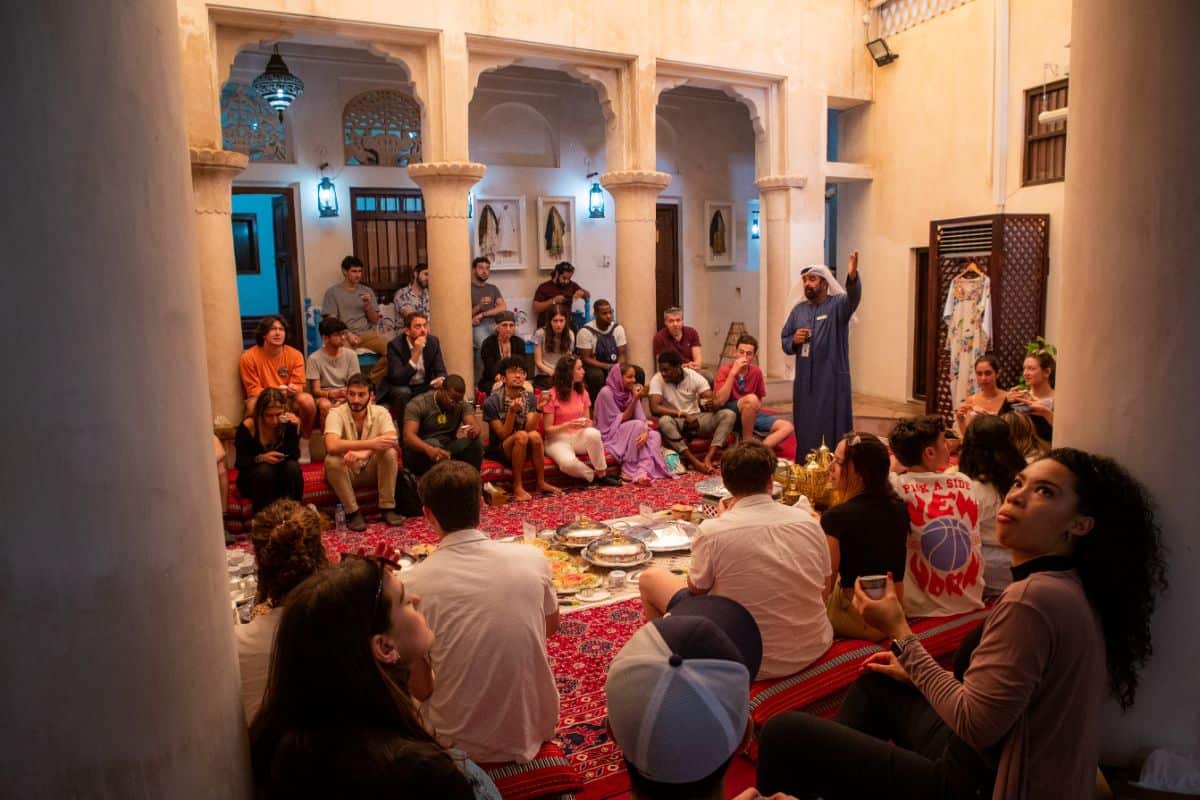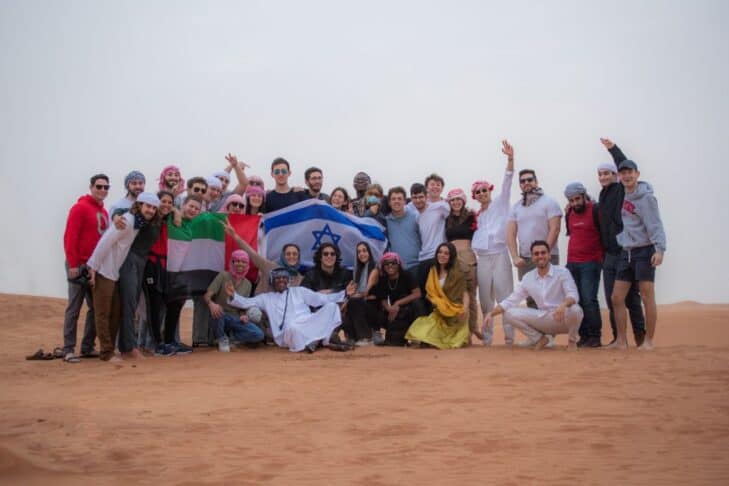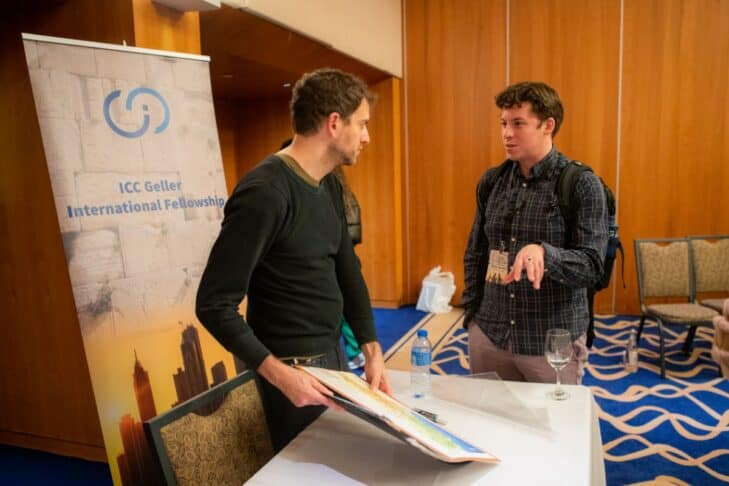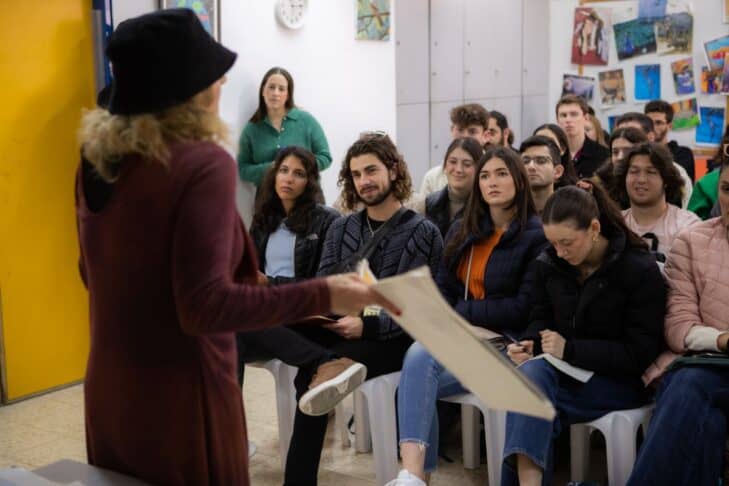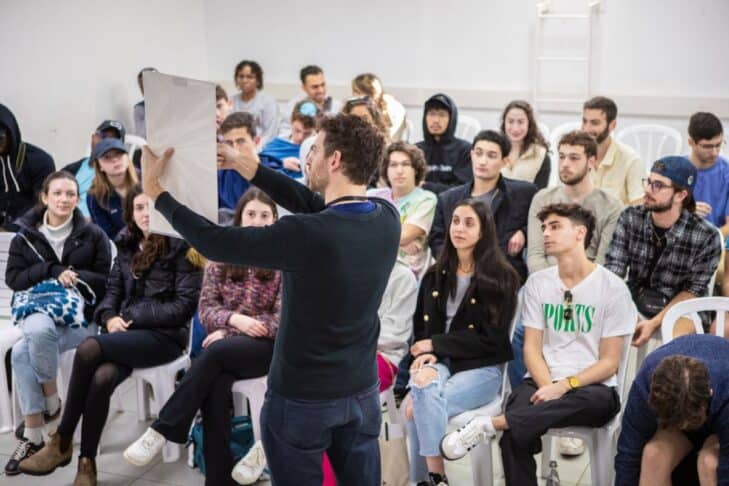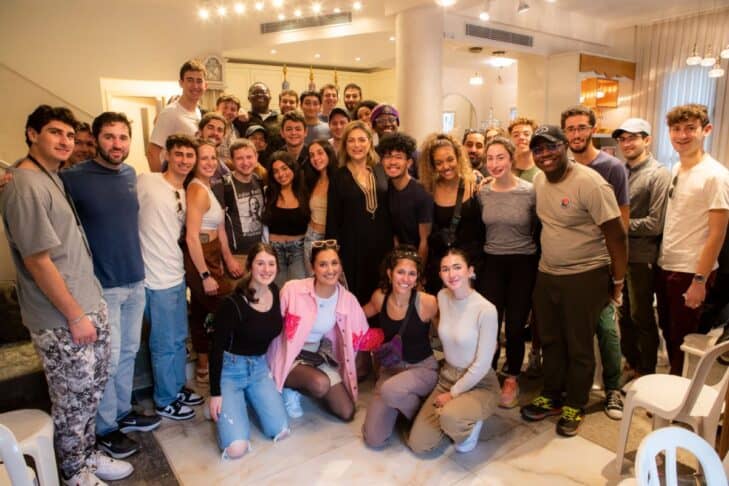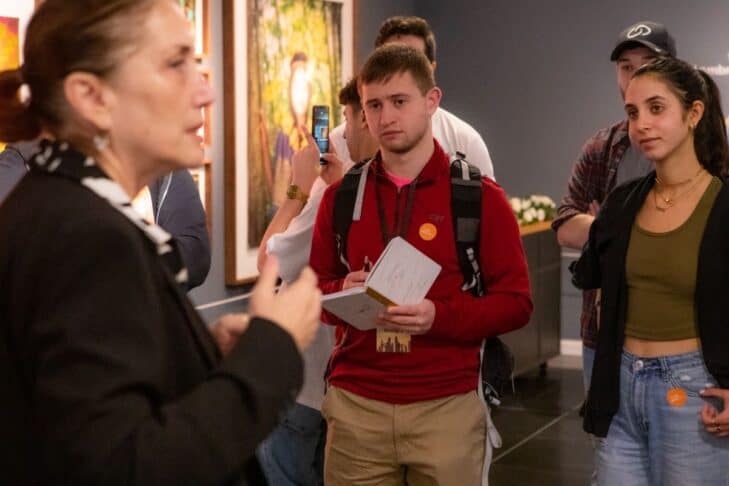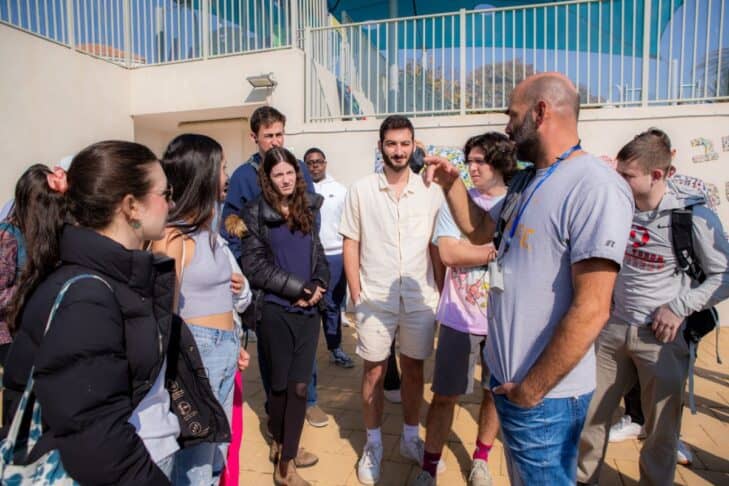In January, four college students from the Boston area took a first-of-its kind trip to Israel and the United Arab Emirates as part of the inaugural cohort of Israel on Campus Coalition (ICC)’s Geller International Fellowship. The trip offered an immersive educational experience in the political, cultural, security, economic and civil rights arenas in the wake of the Abraham Accords, with access to influential policymakers, diplomats and thinkers—with some fun thrown in.
Boston’s Darin Materman (Northeastern), Needham’s Josh May (Michigan State), Medford’s Matthew Karofsky (Tufts) and Marblehead’s Mason Quintero (Amherst) participated. I chatted with Karofsky, Materman and May about what they learned and what they’d like other college students to know.
How did you get involved with the program?
Darin: I’m a second year at Northeastern University, studying political science and economics with a minor in data science. I got involved with ICC’s National Leadership Summit last summer in D.C. They introduced the Geller Fellowship there. I really knew nothing about it at the time, but it sounded like an incredible opportunity. I hit the apply button, and I’m super glad I did, because it was an incredible experience.
Josh: I’m a current junior at Michigan State University, but I come from Massachusetts. I got involved with ICC at the AEPi convention in Miami this past summer. I was the past vice president of my chapter, which networked me into this fellowship. It was a truly life-changing experience.
Matthew: I’m a senior at Tufts University. I’m a double major in biology and Judaic studies; I’m on the pre-med track. I came across this fellowship through AIPAC over the summer. It’s an incredible opportunity. Going through college, I’d been looking for ways to blend my interest in medicine and in the Jewish world. This was a really interesting way to do that. I was blown away by the speakers and with all the opportunities we were exposed to on this trip.
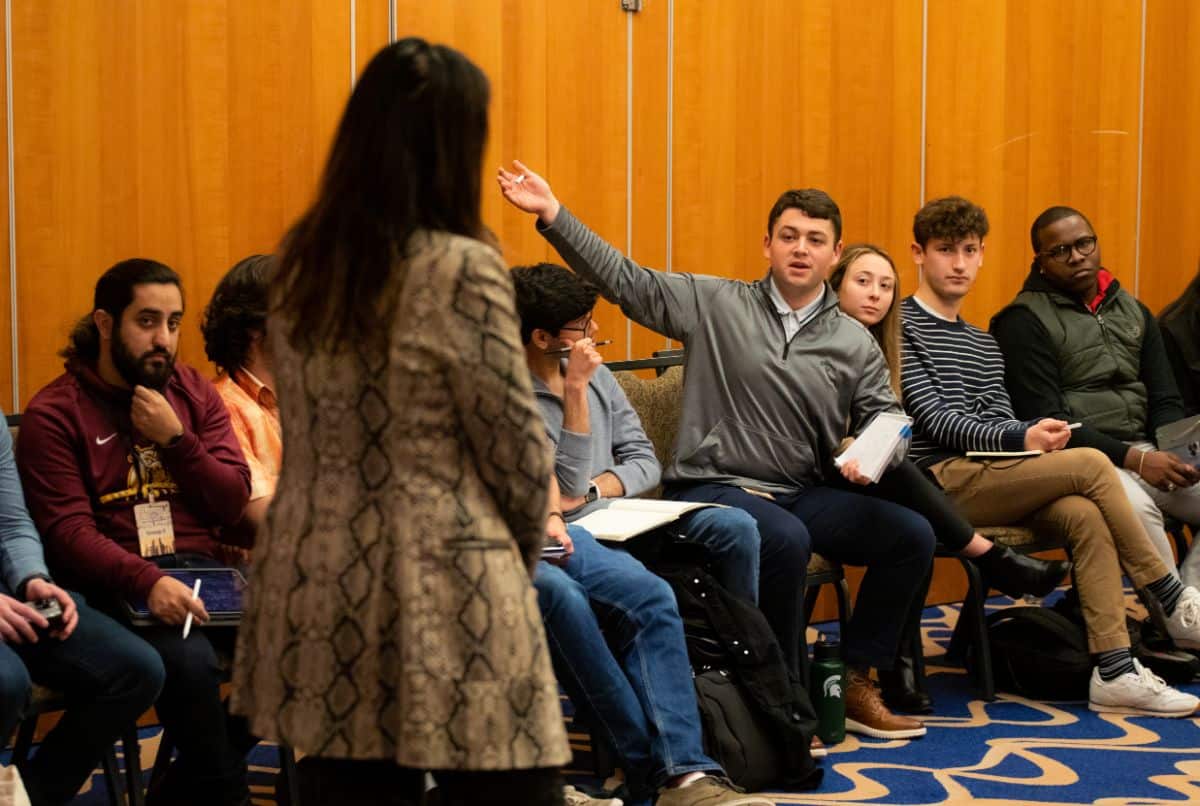
What was your biggest takeaway or learning experience?
Josh: It’s hard to sum up what the program is because this was the first go of it. But the idea is: We want to identify leaders on college campuses who can continue the conversation around antisemitism … and to bring individuals together who otherwise wouldn’t have the platform to have these diverse and difficult conversations around a really nuanced topic. They brought together Jewish and non-Jewish students, HBCU [historically black colleges and universities] students, to really understand how conflict in the Middle East affects our communities in unique ways. We’re all approaching it from a different perspective. For some of us, it’s a Jewish issue. For others, it’s a democracy issue. For others, their families stem from the region and they want to better understand what goes on there today.
Matthew: We had a few meetings prior to the 10-day trip to Israel and to the United Arab Emirates. In Zoom meetings, we talked to various people who were really involved in Israel advocacy in the UN representing Israel. While on the ground in Israel, we focused a lot on the conflict. We spent a lot of time in Jerusalem. We spent some time in Tel Aviv. We took a trip to a settlement in the West Bank. We went to a refugee camp in Bethlehem. So it was really conflict-centered.
There was a lot of cultural exploration, as well. We talked to Arab-Israeli Christians and learned about their perspective on what goes on in Israel. It was a really nuanced trip, I think, to Israel. And then we went to the United Arab Emirates. We focused a lot more on how the Middle East has been evolving since the Abraham Accords, what Israel is doing to reach out to the United Arab Emirates and vice versa. It was a lot of tourism, a lot of exploration of culture and just learning about an area that none of us would have had the opportunity to go to five years ago.
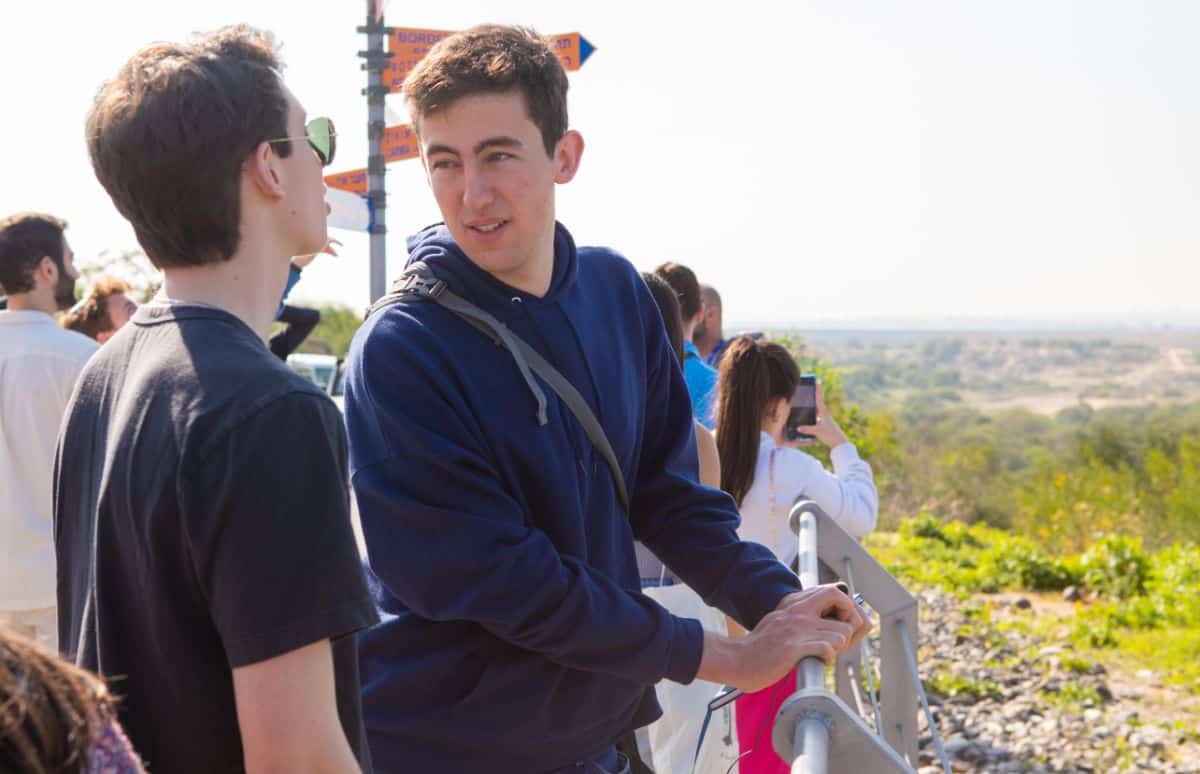
What do you think is the most important conversation right now for college students? What is misunderstood? What isn’t talked about enough?
Josh: It’s a common misconception that there’s not an effort for peace on both sides. And I think a big takeaway from the mission trip as a whole was knowing that people on both sides of this issue want peace, and they want to move forward together. Going back and pulling stuff from the past, to get people riled up and to get people frustrated and get people upset, is not the way that we’re going to solve these issues. It’s going to be through trade. It’s going to be through stuff like the Abraham Accords. It’s not going to be through wars, guns and bombings.
Matthew: The conversations around this topic so often lack nuance. We learned on this trip that there is such a diversity of opinions. The conversations are really not black-and-white ones, and for anyone to try and reduce conversations about Israel and the Middle East to “you have to be on this side or the other,” I think, is fundamentally misrepresenting those conversations and those opinions. … I think it’s so important to hear from people who are directly impacted by the conflict, by peace treaties, to really develop a nuanced understanding and to be able to speak appropriately about it. … It’s so important, I think, for people who speak really authoritatively on these issues back here who really don’t have a lot of exposure to them to understand that diversity before they try and assert their viewpoints.
Darin: One of my biggest takeaways was understanding the scope of the issue. As a student involved in Hillel and Chabad, and other pro-Israel campus organizations, we just think of the Israel-Middle East conflict as a Jewish us-versus-them thing. But we talked to Christian speakers, to Palestinian speakers, we collaborated with students from HBCUs and all across the country. I think this is more of a conflict about peace and people wanting the best for their future, regardless of religion, race, et cetera.

Walk me through your itinerary.
Darin: We were for 10 days to study the Abraham Accords. In the mornings, we would meet with guest speakers and lecturers. We met with ambassadors and people in the Ministry of Finance. We met with people in nonprofits and private sector organizations that all had different stakes in the Middle East situation. We didn’t just meet with political leaders. We met with people in venture capital. We met with cultural leaders in the community. We met with people who had different religious beliefs. We saw refugee camps. We went to the West Bank. We went to Bethlehem. I think it was not to just give us a pro-Israel perspective, but to give us exposure to every side and let us make our own decision.
Josh: I think there was a sense of understanding that, although it is a Jewish issue and it is a Jewish understanding, those ideas spread further than just Jewish students. And that was a big focus, I think.
Matthew: There was a large emphasis on speakers, people who are involved in policy and setting policy, like the Ambassador of Israel to the Emirates, and we spoke with the head of Israel’s economic and trade mission to the Emirates.
There was also a fair amount of touring. We took what’s called a rainbow tour, and we explored LGBTQ+ history in Tel Aviv. We took a tour around the Gaza envelope, and we got to see Israeli communities that are affected directly by violence …. And then there were purely cultural activities. We did a desert safari activity where we were sledding and sand-boarding down sand dunes just to experience the fun. There was a great mix of official meetings with really important people, people who were real change-makers in advancing peace. And there was also a lot of the opposite, where we were just trying to connect to people affected by conflict and peace.
We had a meal when we first arrived at our hotel in Dubai, where we met with some university students. I thought that they were going to talk to us about how they experienced the Abraham Accords and what the reaction to Israel was like, but it was truly just a conversation about: What’s it like growing up as a kid in Dubai?
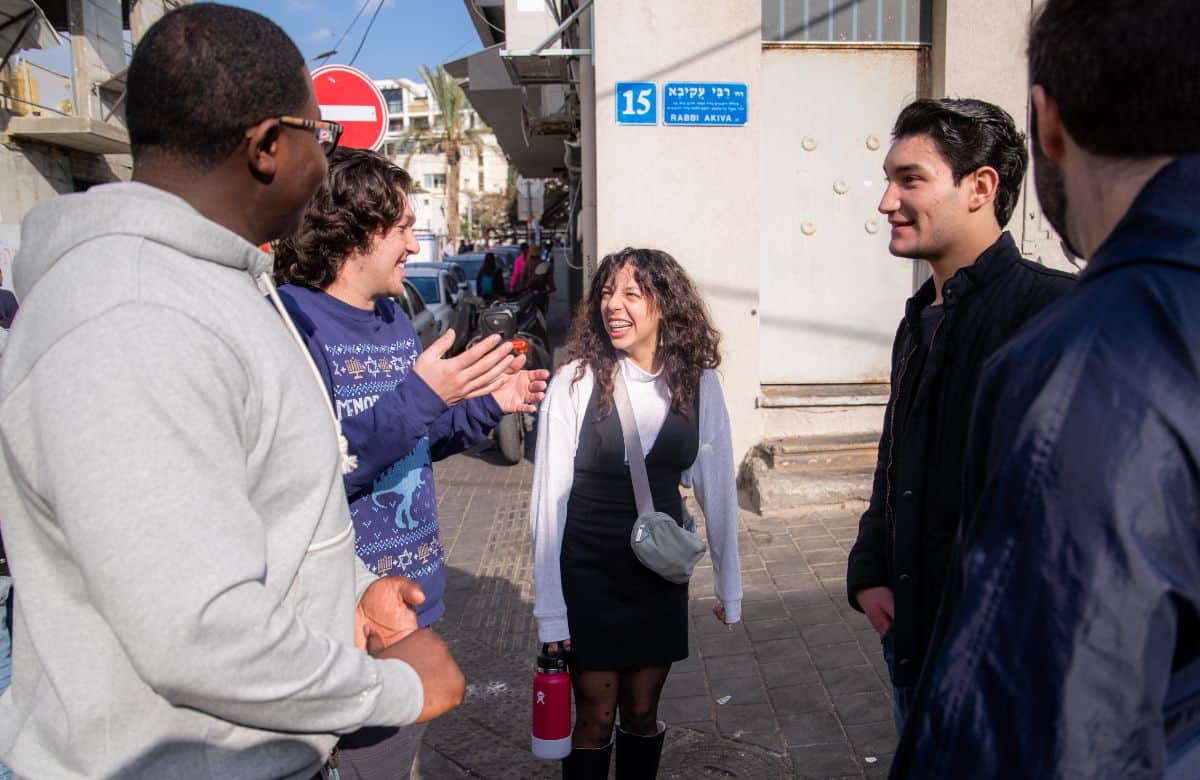
What was the most transformative part of this experience?
Josh: When we visited the Sheikh Mohammed bin Rashid Al Maktoum Centre for Cultural Understanding, we sat down for lunch and had a traditional meal, sitting on the floor, really immersing ourselves in the Emirati culture. When we were sitting there, [the speaker] opened it up to questions. I don’t remember exactly what someone asked, but they wanted to understand what it was like for him growing up.
He was taught that that Jews were the enemy. Israelis were the enemy. But, 50 years later, they felt like they were basically lied to, and that there was no reason for feeling that way. There was no reason for seeing the conflict through that lens. Ultimately, you see, both economies are flourishing and that we’re working together to unite for a better future. Everyone wants that. Everyone wants to stop fighting. It just brought me to tears because I was told, you know, five or six years ago: “You’re never going to go to Dubai. You’re never going to be able to experience it there because it’s just not safe to go as a Jew.” Now, I’ve gone there feeling like I’m safer than I am when I walk around the streets of Manhattan.
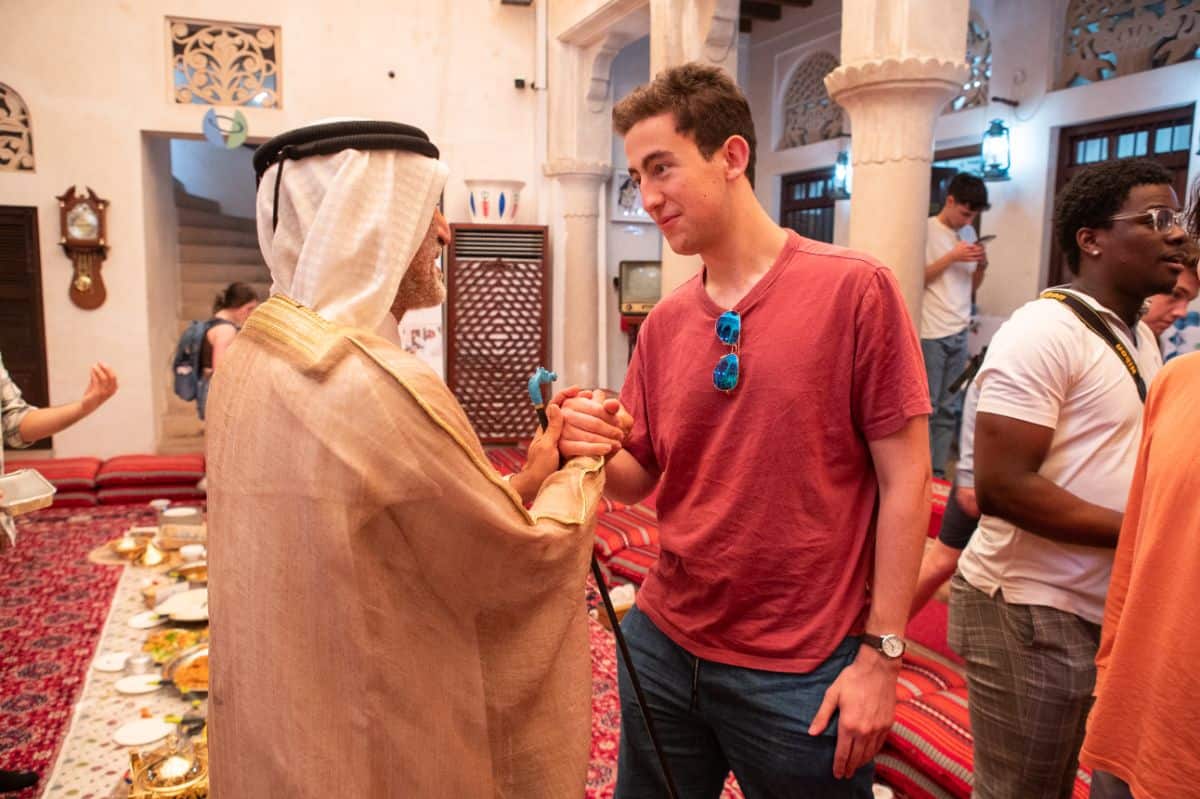
Matthew: The conversations that I had with the other fellows were the most impactful thing for me. Everyone comes from such a diverse background. I got the chance to speak with people who were similarly motivated in a way that I just never would have been able to without this fellowship. Particularly, conversations with around a quarter of the fellowship who were not Jewish—just learning about their motivations as to why they choose to advocate for Israel when it feels like a lot Jews who do so are kind of born into it, and learning about their motivations was so impactful.
Josh: It’s super important to note, especially for our Jewish Boston community, is that you could find every stream of Judaism on this trip, from ultra-Orthodox to Reform and progressive. This trip brought together a group of Jews specifically in this instance that don’t always agree on the topic of Israel. But we were able to put that all aside for the sake of having these conversations.
Darin: One thing that really stood out to me was the hope that I heard and saw on everyone’s faces as they gave their talks. I think the region has been missing hope for a really long time, coming out of the events of the early 2000s. People kind of see a new path forward. … I think the realization when this hit was when I called my grandma, who had lived in Israel and fought in the army. She said, “Wow, I never thought in my life that Jews would be able to do this and be able to fly over Saudi Arabia to the UAE and be welcomed with open arms.”
